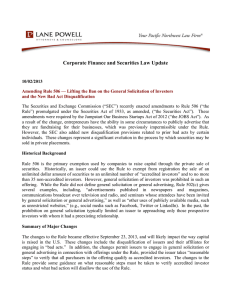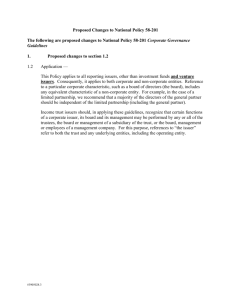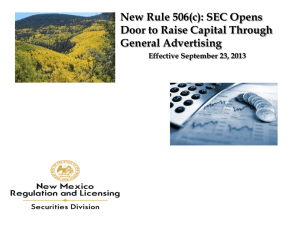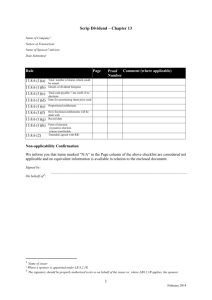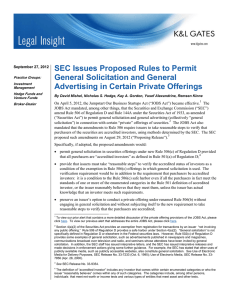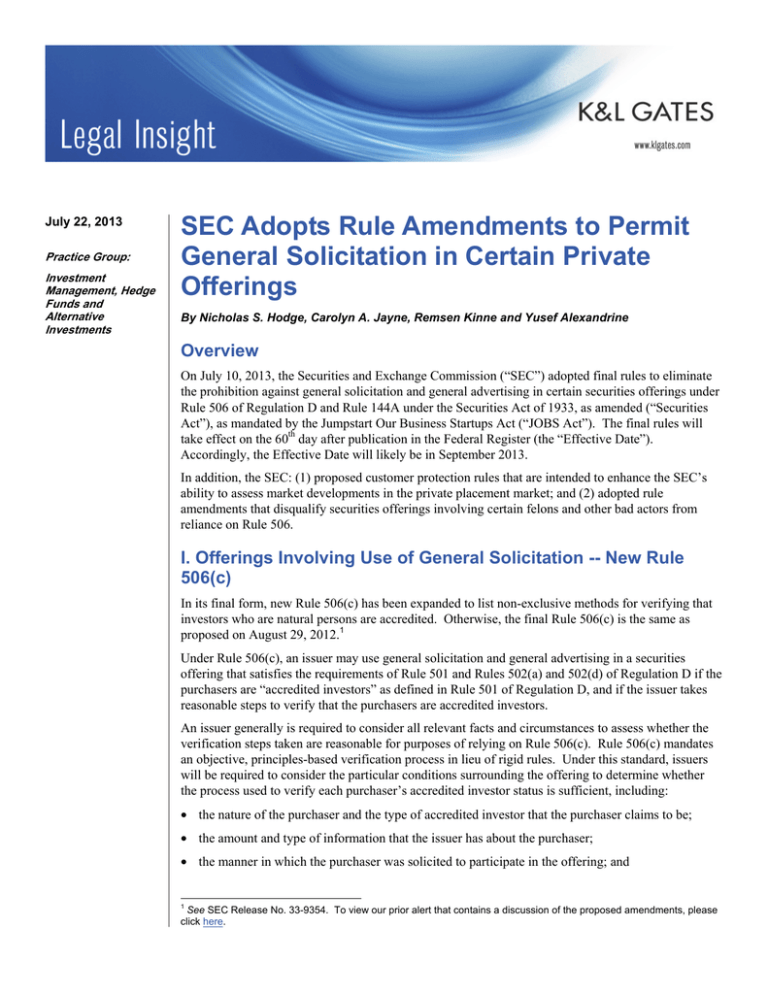
July 22, 2013
Practice Group:
Investment
Management, Hedge
Funds and
Alternative
Investments
SEC Adopts Rule Amendments to Permit
General Solicitation in Certain Private
Offerings
By Nicholas S. Hodge, Carolyn A. Jayne, Remsen Kinne and Yusef Alexandrine
Overview
On July 10, 2013, the Securities and Exchange Commission (“SEC”) adopted final rules to eliminate
the prohibition against general solicitation and general advertising in certain securities offerings under
Rule 506 of Regulation D and Rule 144A under the Securities Act of 1933, as amended (“Securities
Act”), as mandated by the Jumpstart Our Business Startups Act (“JOBS Act”). The final rules will
take effect on the 60th day after publication in the Federal Register (the “Effective Date”).
Accordingly, the Effective Date will likely be in September 2013.
In addition, the SEC: (1) proposed customer protection rules that are intended to enhance the SEC’s
ability to assess market developments in the private placement market; and (2) adopted rule
amendments that disqualify securities offerings involving certain felons and other bad actors from
reliance on Rule 506.
I. Offerings Involving Use of General Solicitation -- New Rule
506(c)
In its final form, new Rule 506(c) has been expanded to list non-exclusive methods for verifying that
investors who are natural persons are accredited. Otherwise, the final Rule 506(c) is the same as
proposed on August 29, 2012.1
Under Rule 506(c), an issuer may use general solicitation and general advertising in a securities
offering that satisfies the requirements of Rule 501 and Rules 502(a) and 502(d) of Regulation D if the
purchasers are “accredited investors” as defined in Rule 501 of Regulation D, and if the issuer takes
reasonable steps to verify that the purchasers are accredited investors.
An issuer generally is required to consider all relevant facts and circumstances to assess whether the
verification steps taken are reasonable for purposes of relying on Rule 506(c). Rule 506(c) mandates
an objective, principles-based verification process in lieu of rigid rules. Under this standard, issuers
will be required to consider the particular conditions surrounding the offering to determine whether
the process used to verify each purchaser’s accredited investor status is sufficient, including:
• the nature of the purchaser and the type of accredited investor that the purchaser claims to be;
• the amount and type of information that the issuer has about the purchaser;
• the manner in which the purchaser was solicited to participate in the offering; and
1
See SEC Release No. 33-9354. To view our prior alert that contains a discussion of the proposed amendments, please
click here.
SEC Adopts Rule Amendments to Permit General
Solicitation in Certain Private Offerings
• the terms of the offering, particularly a minimum investment amount.
The adopted guidance sets forth flexible and sliding scale approaches toward assessing these factors.
For a description of the similar related guidance provided by the SEC in the proposing release, see our
prior alert.
The final rule provides additional guidance to issuers that wish to comply with Rule 506(c) by
including a non-exclusive list of methods that may be used to verify that purchasers who are natural
persons are accredited investors. An issuer shall be deemed to have taken reasonable steps to verify
accredited investor status if the issuer uses, at its option, one of the following methods of verifying
(provided that the issuer does not know that the person is not accredited):
• reviewing copies of Internal Revenue Service forms reporting a purchaser’s income for the two
most recent years, and obtaining the purchaser’s written representation that the purchaser has a
reasonable expectation of reaching the income level necessary to qualify as an accredited investor
during the current year;
• reviewing one or more of the following types of documentation, dated within the prior three
months, and obtaining the purchaser’s written representation that all liabilities necessary to make a
determination of net worth have been disclosed:
o
for assets: bank statements, brokerage statements and other statements of securities holdings,
certificates of deposit, tax assessments and appraisal reports issued by independent third
parties; and
o
for liabilities: a credit report from at least one of the nationwide consumer reporting agencies;
• obtaining a written confirmation from a registered broker-dealer, an SEC-registered investment
adviser, a licensed attorney, or a certified public accountant that such person or entity has taken
reasonable steps to verify that the purchaser is an accredited investor within the prior three months
and has determined that such purchaser is an accredited investor; or
• for any natural person who purchased an issuer’s securities as an accredited investor prior to the
effective date of Rule 506(c) and remains an investor of the issuer at the time of the Rule 506(c)
offering conducted by the same issuer, obtaining the purchaser’s written certification that the
purchaser is an accredited investor.
The Rule 506(c) verification requirement does not supplant the “reasonable belief” standard that is
part of the Rule 501 definition of accredited investor in Regulation D. The final rule confirms the
SEC’s view, articulated in the proposed rule release, that, if the purchaser actually meets the Rule 501
enumerated requirements for an accredited investor but the issuer has not taken reasonable steps to
verify accredited status, the Rule 506(c) safe harbor would not be available (unless the issuer has
actual knowledge that the purchaser meets one or more of the Rule 501 enumerated categories). Thus,
the verification requirement is separate and distinct from the requirement that all purchasers be
accredited investors.
Offerings Not Involving Use of General Solicitation – Renumbered Rule 506(b)
The final rule preserves the existing ability of issuers to conduct Rule 506 offerings without the use of
general solicitation and without verifying purchasers’ accredited status, under renumbered Rule
506(b). Thus, if there is no general solicitation, an issuer must only have a reasonable belief that a
purchaser is an accredited investor.
2
SEC Adopts Rule Amendments to Permit General
Solicitation in Certain Private Offerings
Considerations to Take into Account Before Relying on Rule 506(c)
Each issuer relying on Rule 506 will be required to disclose in Form D whether it is relying on Rule
506(b) or Rule 506(c) with respect to each securities offering that it conducts. A sponsor of multiple
private funds should not conduct offerings concurrently under Rule 506(b) and Rule 506(c) without
first considering whether any general solicitation conducted under the Rule 506(c) offerings would
compromise the safe harbor for the Rule 506(b) offerings. An issuer will not be permitted to check
both the Rule 506(b) box and the Rule 506(c) box in Form D at the same time for the same offering.
Investment pools that trade commodity interests may be unable to engage in general solicitations
despite the adoption of Rule 506(c) if their general partners, managers or advisers rely on the de
minimis exemption from commodity pool operator (“CPO”) registration. The de minimis exemption
in Commodity Futures Trading Commission (“CFTC”) Regulation 4.13(a)(3) requires interests in the
commodity pool to be offered and sold without marketing to the public in the United States.
Similarly, investment pools whose general partners, managers or advisers are registered as CPOs and
rely on the exemptive relief set forth in CFTC Regulation 4.7(b) (for offerings limited to sophisticated
investors) may be unable to engage in general solicitations due to a similar prohibition against
marketing to the public. We understand that CFTC staff intends to consider whether to modify these
exemptions in response to the adoption of Rule 506(c).
Rule 506(c) may not be retroactively available to issuers who inadvertently used general solicitation in
an offering, since the Rule requires issuers to verify the accredited investor status of an investor before
a sale is made.
An issuer that is conducting a Rule 506 offering at the time Rule 506(c) becomes effective may elect
to continue that offering in accordance with Rule 506(b) or Rule 506(c).
Amendments to Rule 144A
As mandated by Section 201(b) of the JOBS Act, the final rule also amends Rule 144A(d)(1) under
the Securities Act to provide that securities can be offered pursuant to Rule 144A to persons other than
Qualified Institutional Buyers (“QIBs”), including by means of general solicitation, so long as the
securities are purchased only by persons that the seller and any person acting on behalf of the seller
reasonably believe are QIBs (as defined in Rule 144A). This rule amendment effectively permits
general solicitations in Rule 144A offerings.
II. Proposed Customer Protection Rules
Due in part to concerns about the greater potential for fraud in connection with general solicitations,
the SEC proposed amendments to Regulation D, Form D and Rule 156 under the Securities Act.
These proposed amendments would:
• require issuers to file an initial Form D no later than 15 calendar days in advance of the first use of
general solicitation in a Rule 506(c) offering2 (and to amend such initial Form D within 15
calendar days after the date of first sale of securities to complete any remaining information);3
2
It is unclear how inadvertent general solicitations would be handled, although the SEC requested comments on
this topic.
3
An initial Form D would not be required if a Form D has been filed containing all information required with
respect to a Rule 506(c) offering (i.e., in connection with an ongoing offering). In addition, an amendment to the initial
Form D would not be required to the extent that all information required by Form D was provided in the initial filing.
Notably, the SEC has proposed permitting issuers to file an initial Form D without contemplating a specific offering,
although the details of this process remain unclear.
3
SEC Adopts Rule Amendments to Permit General
Solicitation in Certain Private Offerings
• require all issuers relying upon Rule 506 (whether or not engaged in a general solicitation) to file a
closing Form D amendment within 30 calendar days after the termination of an offering;
• amend Form D to require disclosure of additional information, including but not limited to, the
issuer’s website (if any), types of general solicitation used and the methods used to verify
accredited investor status;
• disqualify an issuer from relying upon Rule 506 for future offerings for one year if the issuer, or
any predecessor or affiliate of the issuer, did not comply with all Form D filing requirements in a
Rule 506 offering within the last five years;4
• require issuers to include prescribed legends in any written general solicitation materials in
connection with any Rule 506(c) offering;
• require that private fund issuers (i.e., issuers that rely upon the exceptions in Section 3(c)(1) or
Section 3(c)(7) of the Investment Company Act of 1940, as amended) include additional legends in
written general solicitation materials, as well as disclosures concerning performance data (if used
in such materials);5
• disqualify an issuer from relying upon Rule 506 for future offerings if the issuer, or any
predecessor or affiliate of the issuer, has been subject to any order, judgment or court decree
enjoining such person for failure to include such legends and disclosures (as described in the
preceding two bullet points) or for failure to submit written general solicitation materials (as
described in the following bullet point);
• for two years following the effective date of the proposed rules, require issuers to submit any
written general solicitation materials to the SEC no later than the date of first use of such
materials;6 and
• amend Rule 156 to apply to private funds (whether or not engaged in general solicitations), thereby
providing guidance on the types of information in sales literature that could be misleading under
the antifraud provisions of the federal securities laws.
The SEC has described these proposed amendments as providing “better tools to evaluate this
changing market,” which would assist federal and state enforcement efforts. In fact, the SEC
describes how these proposed amendments would support its plan to review and analyze the use of
Rule 506(c) through the coordinated efforts of staff from the Division of Corporation Finance, the
4
This disqualification would be in addition to the existing disqualification from reliance upon Rules 504, 505 and
506 that arises from a court injunction for failure to comply with Rule 503. The SEC emphasized that it determined not to
propose making the filing of Form D a condition of Rule 506 due to the fact that the loss of a Securities Act exemption
would result in severe sanctions (e.g., rescission rights and the loss of “blue sky” pre-emption) that would be
disproportionate to the harm of failing to file the Form D. Instead, issuers that failed to comply with the Form D filing
requirements (or whose predecessors or affiliates failed to comply with the Form D filing requirements) within the last five
years would be prevented from relying upon Rule 506 for future offerings for a period of one year. This five-year lookback period would not extend past the proposed rule’s effective date. In addition, the proposed amendments would
include a cure period of 30 calendar days to allow issuers to correct oversights, but this proposed cure period would be
available only for an issuer’s first failure to file timely a Form D or Form D amendment. The proposed rules would also
permit the SEC (or its anticipated delegatee, the Director of the Division of Corporation Finance) to waive any
disqualification upon a showing of good cause.
5
Because such offering materials are subject to the antifraud provisions of the federal securities laws, many
advisers already include disclosures similar to those proposed by the SEC.
6
The SEC does not propose that such materials would be treated as “filed” or “furnished” for purposes of the
Securities Act or the Securities Exchange Act of 1934, as amended, including the liability provisions thereunder. In
addition, the SEC indicated that it does not contemplate conducting a staff review of such written general solicitation
materials.
4
SEC Adopts Rule Amendments to Permit General
Solicitation in Certain Private Offerings
Division of Economic and Risk Analysis, the Division of Investment Management, the Division of
Trading and Markets, the Office of Compliance Inspections and Examinations, and the Division of
Enforcement. Taken as a whole, if adopted, these changes would make Form D more integral to the
private offering process and could mark the start of evolving “regulatory creep” that uses Form D to
regulate the private offering process, much as Form ADV has evolved from a “census-like” document
into a regulatory and disclosure document.
III. Bad Actor Provisions
The SEC also adopted rule amendments, as required by the Dodd-Frank Wall Street Reform and
Consumer Protection Act, that disqualify securities offerings involving certain felons and “bad actors”
from relying on Rule 506. The disqualification provisions cover the following persons, among
others— (1) the issuer; any general partner or managing member of the issuer; (2) any beneficial
owner of 20% or more of the issuer’s outstanding voting equity securities; (3) any investment manager
to an issuer that is a pooled investment fund; and (4) any compensated solicitor (collectively,
“Covered Persons”). The disqualifying events include, among others—(1) certain criminal
convictions; (2) certain injunctions and restraining orders; and (3) certain SEC disciplinary orders.
These Rule amendments will take effect on the Effective Date. Significantly, they will apply only to
triggering events occurring after the Effective Date, with pre-existing events being subject to
mandatory disclosure.
Considerations for Issuers that are Conducting or are Planning to Conduct Rule
506 Offerings
The Rule amendments require that an issuer furnish to each purchaser, a reasonable time prior to sale,
a description in writing of any matters that would have triggered disqualification but that occurred
before the Effective Date. Accordingly, an issuer must be prepared to provide such a description to
investors a reasonable time prior to any sale that takes place on or after the Effective Date. To that
end, issuers should identify all Covered Persons and determine whether they are subject to any
disqualifying event under the Rule. An issuer may want to consider sending a questionnaire to each
beneficial owner of 20% or more of the issuer’s outstanding voting equity securities to obtain the
information needed to comply with Rule 506.
Authors:
Nicholas S. Hodge
Remsen Kinne
nicholas.hodge@klgates.com
+1.617.261.3210
remsen.kinne@klgates.com
+1.415.882.8019
Carolyn A. Jayne
Yusef Alexandrine
carolyn.jayne@klgates.com
+1.312.807.4299
yusef.alexandrine@klgates.com
+1.415.249.1044
5
SEC Adopts Rule Amendments to Permit General
Solicitation in Certain Private Offerings
Anchorage Austin Beijing Berlin Boston Brisbane Brussels Charleston Charlotte Chicago Dallas Doha Dubai Fort Worth Frankfurt
Harrisburg Hong Kong Houston London Los Angeles Melbourne Miami Milan Moscow Newark New York Orange County Palo Alto Paris
Perth Pittsburgh Portland Raleigh Research Triangle Park San Diego San Francisco São Paulo Seattle Seoul Shanghai Singapore Spokane
Sydney Taipei Tokyo Warsaw Washington, D.C. Wilmington
K&L Gates practices out of 48 fully integrated offices located in the United States, Asia, Australia, Europe, the
Middle East and South America and represents leading global corporations, growth and middle-market companies,
capital markets participants and entrepreneurs in every major industry group as well as public sector entities,
educational institutions, philanthropic organizations and individuals. For more information about K&L Gates or its
locations, practices and registrations, visit www.klgates.com.
This publication is for informational purposes and does not contain or convey legal advice. The information herein should not be used or relied upon in
regard to any particular facts or circumstances without first consulting a lawyer.
©2013 K&L Gates LLP. All Rights Reserved.
6

